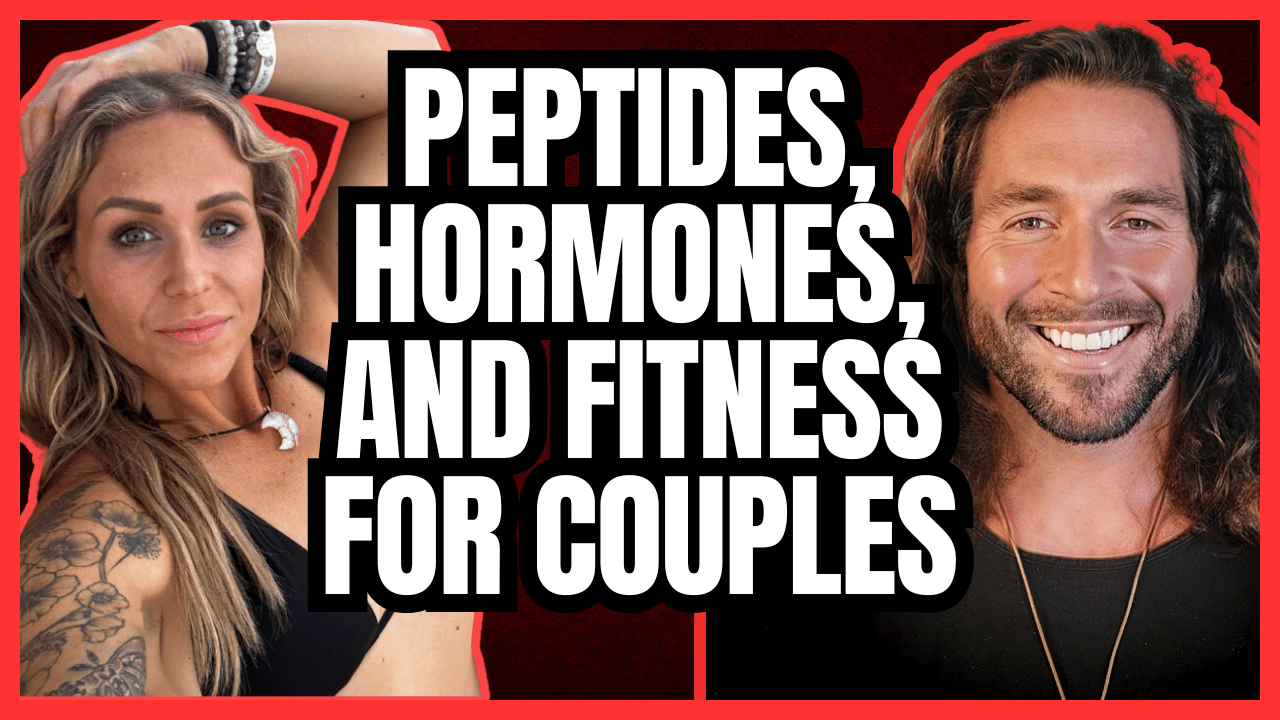Quick PSA: Taylor and I will be streaming live tomorrow morning at 9 AM EST taking all of your questions. We’ll broadcast from her YT channel and my X account if you want to join!
Happy Friday!
Today, I released a video on Spotify/iTunes on the connection between testosterone and your mental health.
For years, I walked around with what I call “high-functioning misery” (low-grade depression, anxiety, existential dread), all while looking like a fit, D1 athlete on the outside.
It wasn’t until I discovered just how low my testosterone actually was and fixed it that the fog lifted and my inner world finally matched what people saw on the outside.
Today I want to zoom out from just “my story” and show you what the data actually says about testosterone therapy and mental health in both men and women.
Because while testosterone is not a magic cure for depression or anxiety, it is a critical piece of the mental health equation that almost everyone is ignoring.
FYI, Until Tonight at Midnight PST, BioLongevity Labs is offering 20% off seven fat-incinerating products. Use code HUNTERW to get an additional 15% off.
The Mental Health Crisis
We’re living through a mental health crisis.
You don’t need a study to see it.
Just walk down the street, scroll social media, or talk to your friends.
If you go to a standard doctor or psychiatrist and say, “I’m depressed, anxious, can’t think straight, no energy, no motivation,” you know exactly what happens:
You get a prescription for an SSRI, maybe a benzo
You might get a therapy referral
Almost nobody checks your testosterone (or estradiol, progesterone, thyroid, etc.) in a serious way
And yet, cross-sectional studies suggest that 35–50% of men with clinically low testosterone have significant depressive symptoms, fatigue, and poorer quality of life compared to men with normal levels.
That’s a massive chunk of the male population walking around with biochemical brakes on their brain and being told the problem is purely “in their head.”
Is low testosterone the only cause of mental health issues? Of course not.
Does fixing testosterone fix everything? Absolutely not.
But if you’re ignoring hormones, you’re ignoring a physical root cause that can make every other mental, emotional, and spiritual intervention 10x harder.
What the Data Says
Let’s start with men, because this is where the data is strongest.
A large 2019 meta-analysis pooled 27 randomized controlled trials with 1,890 men and found that testosterone therapy significantly reduced depressive symptoms compared to placebo. Men on testosterone were more than twice as likely to achieve a 50% improvement in depression scores (odds ratio ~2.3).
A couple of important details from that paper and others:
The effect was stronger in men who actually had low testosterone
Higher-dose regimens within the physiologic range tended to produce the biggest mood improvements
These were not bodybuilding doses, they were medical doses aimed at restoring normal levels
Other trials in older men with low T have shown similar things.
One year of daily testosterone gel led to improved mood and reduced depressive symptoms versus placebo, even though the dose was relatively conservative.
For me personally, once my levels were optimized, the background noise of dread and heaviness I had normalized for years just faded.
Life still had contrast.
There were still hard days.
But I had the horsepower to deal with them.
Anxiety, Stress Resilience, and the Myth of “Roid Rage”
The research on anxiety is thinner, but clinically and in the literature there’s a consistent pattern:
Men with low testosterone report more:
Anxiety and nervousness
Sleep disturbances
Difficulty handling normal life stress
Studies in young men with congenital hypogonadism show improvements in social functioning and reduced confusion/inactivity once testosterone is corrected.
Guys go from:
“Everything stresses me out, I can’t decide, I’m paralyzed, I just want to escape…”
to:
“Okay, life is still stressful…but now it feels like a game I can actually play and win.”
At physiologic replacement doses in hypogonadal men, testosterone does not cause “roid rage”.
Controlled studies show:
No increase in aggression vs placebo
No spike in mania or hypomania
Mood stabilizes as irritability, lethargy, and low mood improve
The caricature of the angry, psychotic “testosterone guy” overwhelmingly comes from supraphysiologic steroid abuse plus often crashed estrogen (thanks to heavy aromatase inhibitor use).
That is a totally different universe from a man going from 280 ng/dL to 800 ng/dL under medical supervision.
I genuinely felt more unstable and prone to weird emotional outbursts before TRT, because my brain was trying to run life on fumes.
Optimized testosterone gives you emotional headroom to respond instead of react.
What About Women?
Women often find the conversation on this topic more complicated, as research hasn't caught up yet, and the medical community still feels unsure or hesitant about androgens in women.
One randomized controlled trial looked at women with antidepressant-resistant major depressive disorder and added low-dose testosterone cream for 8 weeks.
The results? Both the testosterone and placebo groups improved, but there was no significant difference between them in depression or fatigue scores.
On the other hand, a more recent pilot study in peri- and postmenopausal women found that after 4 months of testosterone therapy:
47% reported mood improvement
39% reported subjective cognitive improvement
Mean mood problems dropped by ~34%, cognitive symptoms by ~22%
Is that definitive? No. It’s not a big, tightly controlled trial.
Is it interesting? Very.
Add to that the countless menopausal women who report:
Less brain fog
Better libido (huge for overall well-being)
More drive and “get-up-and-go”
…once their testosterone is gently replaced (often alongside estradiol and progesterone), and a pattern starts to emerge.
The Endocrine Society is still conservative here and does not recommend testosterone for women just for “mood” or “well-being” yet.
But if you’re a woman with low libido, fatigue, flat mood, and you’ve never had your testosterone assessed…you are not crazy for wondering if that might be part of the picture.
TRT Is Not a Magic Bullet
Here’s where I want to be very clear:
Low testosterone does not always mean mental health issues
Optimizing testosterone does not guarantee you’ll never struggle mentally again
You still have:
The emotional layer (unprocessed trauma, patterns, beliefs)
The psychological layer (habits of thought, behavior loops)
The spiritual layer (meaning, purpose, connection)
Environment, sleep, food, light, movement, relationships
But if your physical layer is fundamentally off, then trying to “mindset” your way out of depression is like trying to drive a car with three flat tires and a cracked engine block.
TRT (for the right person, with the right labs, done correctly) is about removing a massive physiological anchor on your nervous system so everything else you’re doing (therapy, meditation, journaling, breathwork, community) can actually work.
I’ve seen it over and over again:
Men who thought they were “just anxious” suddenly feel calm for the first time in decades
Women who thought they were “just getting older” realize their cognitive fog and low libido had a hormonal fingerprint
People chained to psych meds for years finally discover that no one ever checked the most basic hormone that regulates mood, motivation, and resilience
Is testosterone the answer in 100% of cases? Obviously not.
But if we’re being honest, I’d bet that a huge chunk of the modern mental health burden is happening on a background of unaddressed hypogonadism.
What To Do
If you’re reading this and you’re in the thick of depression, anxiety, brain fog, and zero drive, here’s my simple ask:
Before you accept that “this is just how my brain is,” get your hormones checked properly.
That means:
Total and free testosterone
Estradiol
SHBG
Thyroid panel
In women, also progesterone and other relevant sex hormones
If they’re normal, great. We look elsewhere.
If they’re not, now you have data you can act on.
You are not your lab numbers.
But if you change your lab numbers, your mind, your life, and your future can change more than you ever imagined.
Best,
Hunter Williams
Further Reading & References


